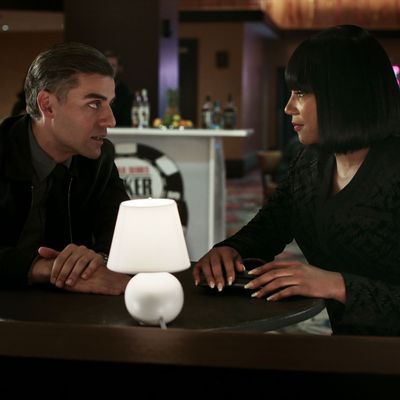
The first time images from Abu Ghraib appear in The Card Counter, it’s as though the screen has ruptured and something terrible it had been holding back has spilled out. The Card Counter is a film about professional gambling, which is to say that it’s a film that takes place almost entirely in regionless anyplaces like the floors of casinos, the interiors of roadside eateries, and the anonymous motel rooms its protagonist, who goes by the name William Tell (Oscar Isaac), prefers for the night. William has secrets, of course — one of the first things we’re told about him is that he learned to count cards during a ten-year incarceration — but being aware of that doesn’t prepare you for the full-on sensory assault of his memories of his time committing atrocities in that Iraq prison. They spew out in sequences shot with an extreme wide-angle lens that makes whatever horror is directly in front of the camera lurch forward while turning the world into a maze. Heavy metal, the soundtrack of “enhanced interrogation,” blares, a technique that works on its afflicters as well as the afflicted. When Cirk (Tye Sheridan), a kid William takes under his wing, tunes the car radio to something guitar-heavy, William shuts the music off, telling him, “If you’ve actually ever been there, you’d never want to hear that shit again.”
The Card Counter, a compact thriller (of sorts), is the new film from Paul Schrader, a writer and director whose interest in tormented, solitary men extends back to his screenplay for Taxi Driver. William’s particular brand of solitary torment places him somewhere between First Reformed’s Ernst Toller, the moody minister with whom he shares a whiskey-and-journaling habit, and Alain Delon in Le Samouraï, with whom he shares an austere cool. What makes The Card Counter so delicious, aside from the Mad Libs quality of the way it connects card playing and government-sanctioned torture, is that the movie undermines the Spartan swagger of William’s half-existence as often as it basks in it. When William sees the mess Cirk has made of the hotel room he’s been staying in, he asks, “You live like this?” Later, when Cirk gets a look at how William habitually covers and wraps everything in the rooms he rents with white throw cloths, as though camping out in a house that’s been closed for the season, he returns the question.
La Linda, played by Tiffany Haddish, finds financial backers for players on the pro circuit who need to be staked, and even she finds William’s commitment excessive, teasing him about how he should go out to a park once in a while. Haddish, who doesn’t have many non-comedic roles under her belt, is given a femme fatale’s entrance that doesn’t suit her, and the first salvos between her and Isaac (“That’s what you do, you run a stable?” “I’m always looking for a good thoroughbred”) are unpromisingly awkward. Haddish is too implicitly warm a screen presence to match the severity Isaac comes into the film exuding, and she labors with some of the stylized banter she’s given. But the two actors have an affinity for one another that’s impossible to ignore, and their characters’ flirtations are hot in a wonderfully off-kilter way. Rather than become an accessory to William’s guilt-ridden itinerancy, La Linda makes it look like it’s as much an affectation as his nemesis on the poker circuit, a Ukrainian player who wears the stars and stripes and chants “U-S-A! U-S-A!” whenever he knocks someone out at the table. She forces William to break character, and in doing so, to acknowledge the element of kayfabe in the subsistence he’s chosen for himself.
William’s guilt and rage are real, but if his memories of the military are a hellscape, his card playing is a purgatory in which he can avoid dealing with his past. La Linda and Cirk, in different ways, require him to start engaging again — La Linda because she represents the promise of a real life, and Cirk because he reminds William of himself. Cirk is a college dropout who’s become fixated on killing John Gordo (Willem Dafoe, dripping menacing smarm), the major turned private contractor who trained his father, and who trained William, at Abu Ghraib. While William was jailed for what he did, Cirk’s father was dishonorably discharged and went on to become an abusive alcoholic who killed himself. Cirk’s drive for revenge is clearly born out of a desire to identify a single source of his pain — a vaguely thought-out plan to install grandeur and purpose into a life going nowhere. William recognizes the puerility of Cirk’s dead-end mission, and without acknowledging the degree it’s also his, dedicates himself to helping the young man move on. The Card Counter takes place in a punishing world of windowless casinos, hotel ballrooms, and highways devoid of scenery — a vision of the America used to justify the actions that now so traumatize William, that is intentionally bereft of poetry until La Linda takes William to a park illuminated by Christmas lights. If it’s not a country worth losing your soul for, it’s also not one that will pay any mind to a life spent wallowing in angst over it, either.
More Movie Reviews
- The Accountant 2 Can Not Be Taken Seriously
- Another Simple Favor Is So Fun, Until It Gets So Dumb
- Errol Morris Has Been Sucked Into the Gaping Maw of True Crime


